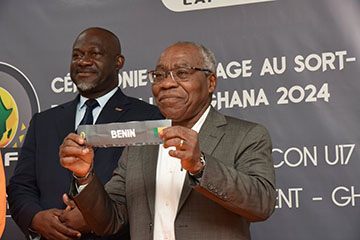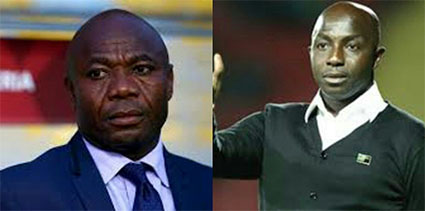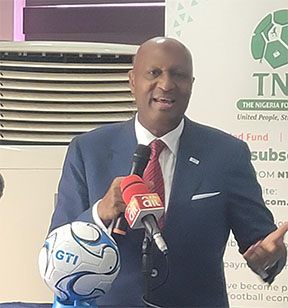Nigerian Football
Sports Medicine Expert, Pambo Explains Nigeria’ Field-Related Obituaries
BY KUNLE SOLAJA
This Thursday, it is one week since a player of Kwara United, Saka Abdulazeez, slumped unchallenged and subsequently passed on while training. Sadly, he added to the growing list of sudden death situations on the Nigerian field. Below is a list of some obituaries recorded in Nigeria or involving Nigerian elsewhere.
- May 6, 1954: David Omofeye aka “Idi” slumped and died during a Lagos first division match between his club, Railway and Marine. This is Nigeria’s first recorded sudden death on the field.
- February 21, 1974: John Akande, left winger, 22, died at a hospital following a collision with an opponent in a league match at the Olubadan Stadium. He was playing for Shooting Stars which he joined six weeks earlier.
- August 12, 1989; Samuel Okwaraji slumped and died, playing for Nigeria against Angola in World Cup qualifying match in Lagos.
- September 9, 1995: Igweniwari George, Golden Eaglets and Enugu Rangers player and younger brother of Finidi, a Super Eagles player, died in the hospital from gunshot wounds sustained after their FA Cup tie with Super Stores ended with riots at Lekan Salami Stadium, Ibadan.
- October 29, 1995: Amir Angwe playing for Julius Berger against Maxaquine of Mozambique in the African Winners Cup slumped and died.
- September 9, 1997: Tunde Charity Ikhidero died in the hospital following head injury sustained in a league match involving his club, Insurance and Niger Tornadoes in Benin on September 6, 1997.
- August 30, 1997: Emmanuel Nwanegbo died of heart failure playing for German lower division side, SSV Reutlingen
- February 23, 2000: John Ikoroma, a former Golden Eaglets player died of heart attack while playing for United Arab Emirates club, Al-Wahda in Dubai.
- April 16, 2000: Gabriel Anas, a central defender of Iwuanyanwu Nationale collapsed and died.
- July 14, 2001: Charles Esheko, 26, playing in India for Bengal Mumbai, suffered massive cardiac arrest on the field and died later in the hospital.
- August 12, 2006: Boniface Danjuma of Plateau United slumped and died in a league match with city rivals, JUTH, exactly 17 years after similar incident involving Samuel Okwaraji.
- May 26, 2009: Orobosa Adun, the goalkeeper of Warri Wolves slumped and died during a training session.
- March 6, 2010: Endurance Idahor, former Julius Berger and Dolphin striker, playing for Al Merreikh of Sudan, collapsed and died in Omdurman while playing against Amal Atbara.
- September 22, 2010: Habib Faloye and Kunle Oyetola, both Nigerian referees, slumped and died while participating in the Cooper Test, a yearly referees’ fitness programme at the Abuja National Stadium.
- December 12, 2010: Emmanuel Ogoli of Ocean Boys died shortly after slumping in a league match with Niger Tornadoes.
Following the latest recorded death on the Nigerian field, Sammy Wejinya, media officer of Rivers United conducted an interview with Dr. Prince Pambo on a WhatsApp forum, “Nigeria Football Support Platform”.
Dr. Pambo, a sports medicine physician and member of Ghana FA medical committee as well as the CAF subcommittee on cardiology, explained possible causes of athletes suddenly slumping on the field and passing on.
According to the sports medicine expert, “the underlying factor to most of these deaths is cardiac arrest with Hypertrophic cardiomyopathy being the commonest cause.”
He mentioned that more people in the black race than the whites are dying. He explained ‘hypertrophic cardiomyopathy’ as a condition where the heart muscles are thicker than normal leading to a distorted cardiac activity.
“It is imperative to note that conditions such as concussion, hypoglycaemia, dehydration…etc’ can cause sudden collapse on the pitch but they rarely lead to death”, Dr. Pambo explained.
Perusing through available statistics, he concluded that Nigeria has the highest incidence of sudden cardiac deaths.
“The simple reason being that Nigeria has a high population and also a vibrant sports nation. There are triggers to these deaths…but most of them just happen without any triggers.”
He explained cardiac arrest as a phenomenon where the electrical system of the heart is thrown into disarray leading to an uncoordinated beating of the heart.
“The heart is therefore unable to pump blood as it’s supposed to, leading to a cessation.”
He also differentiated cardiac arrest from heart attack which is a circulatory problem. According to Dr. Pambo who is also a CAF sports medicine instructor, FIFA National Project leader for football for health and team physician for Ghana’s Black Stars Team B, “in heart attack there is a blocking of blood flow in the blood vessels ultimately leading to arrest.”
He explained further that “heart attacks are not as sudden as cardiac arrest”. Dr. Pembo explained that heart attack gives warning signs such as chest pain, difficulty in breathing, dizziness and so on.
“Cardiac arrest warning signs are extremely similar to those of heart attack, but the signs are immediately followed by a sudden collapse. Unfortunately for most people, the first sign is actually a collapse”.
He also spoke of possible genetic link. “The statistics lay more occurrences on blacks because their hearts especially West Africans have an exaggerated adaptation to physical activity. They have much thicker heart walls which tends to mimic cardiomyopathy.
“Therefore during screening it is difficult to even distinguish HCM from a normal African adaptation. Also, for most black players, the first time they get screened is when they’re invited to the national teams. At that stage, it is extremely difficult to advise people to give up sports.
“In the case of ‘whites’, they do screening at an early age which makes it easier to identify children with risk factors and then advise them to give up sports entirely.
“As much as these medical conditions cannot be eradicated, it’s important for stakeholders to place a lot of emphasis on pre season medical screening, improve resuscitation skills, and also acquire modern life saving equipment.”
On prevention, Dr. Pambo remarked that the first step will be a well detailed report of the player’s medical history. He advised that certain questions should be examined: “Does he get tired easily when playing? Does dizziness occur? Any family history of sudden death?
“From history we do an ECG to assess cardiac function. We progress to do an ECHO or Cardiac MRI. All these investigations should help diagnose cardiomyopathy easily.”
He also advised on exercising the body. “As much as exercise is good for the heart, any one diagnosed with any heart condition should not exercise without consulting a doctor as not all exercises are helpful.
Nigerian Football
Nigeria face tough defence as Burkina Faso lie in wait at U17 WAFU B AFCON qualifiers

Defending champions Nigeria have been handed a difficult path to the 2025 U17 Africa Cup of Nations finals after being drawn in the same group as Burkina Faso for next month’s WAFU B qualifying tournament in Ghana.
The Golden Eaglets, who won the last edition of the regional championship in 2022, will also face Togo and Niger in Group B of the competition which runs from 15-28 May.
Hosts Ghana find themselves in Group A alongside Cote d’Ivoire and Benin in a tough-looking section of the competition to be played in Accra.
The draw was conducted by 1970s Ivorian football legends Kobenan Kouman and Die Foneye at the Ivorian FA headquarters in Abidjan on Friday.
Nigeria claimed their WAFU B U17 AFCON title by defeating Burkina Faso 2-1 in the regional final in Ghana two years ago.
However, they will need to overcome some familiar foes if they are to defend their crown and with the Burkina Faso finishing third at the last TotalEnergies U17 Africa Cup of Nations, some exciting matches are expected.
Arch-rivals Nigeria and Ghana are among the two favourites and could meet in the final in Accra on 28 May, should they top their respective groups and make it through the semi-finals.
Ghana also have pedigree at this level, having the World Cup in 1991 and 1995 as they bid to reach the U17 AFCON finals on home soil.
The top two teams from the WAFU B tournament will qualify for next year’s U17 Africa Cup of Nations.
Groups:
Group A: Ghana, Cote d’Ivoire, Benin
Group B: Burkina Faso, Nigeria, Togo, Niger.
Nigerian Football
Former Nigeria international, Onye recommends Amuneke-Siasia combo for Super Eagles

BY KUNLE SOLAJA.
Kingsley Onye, the left sided defender who was a member of the first Flying Eagles side to have a podium finish at the U-20 World Cup has suggested the employment of Emmanuel Amuneke as the coach of the Super Eagles.
He wants him to be assisted by Samson Siasia when the ban on the latter lapses in August. Alternatively, Onye pointed to Sylvanus Okpala as alternative to Siasia.
The Super Eagles are in dare need for a head coach as the clock ticks down to the Match day 4 and 5 of the 2026 World Cup qualifiers in which the team is trailing at the third position.
The two matches in early June are crucial for the Super Eagles to bounce back into reckoning as the team can not afford to drop any of the available six points in the duels with South Africa at home and away to Benin.
From this Monday, it is 41 days to the potentially challenging tie with South Africa, but the Nigerian national team has been without a coach since the expiration of the contract of Portugal’s Jose Peseiro shortly after the Africa Cup of Nations in Cote d’Ivoire.
Without mincing words, Onye remarked: “Emmanuel Amuneke is the right man for the job of the coach of Super Eagles. He has been there before.
“He tasted it and had been fantastic with the Nigeria youth team, the U-17 by assisting Manu Garba to win the U17 World Cup in 2013 and as head coach, led the Golden Eaglets to win the cup again in 2015.”
Onye who played for the Enugu Rangers in Nigeria before venturing to the UK but had his career scuppered by freak injury pointed out that the solution to Super Eagles’ technical deficiency is the appointment of an indigenous coach and that Amuneke is the man.
In buttressing his assertion, he declared: “As a senior team coach, Amuneke qualified a long standing absentee team, Tanzania for the 2019 Africa Cup of Nations.
“His record as a player is also very impressive. He played and won with the Super Eagles, the AFCON 1994. He played at the Olympic Games and was also the first Nigerian to score two goals at the World Cup.
“He has played at the African Games and also for top clubs in the continent as he was a member of the Egyptian giants, Zamalek. In Europe, he played for Sporting Clube de Portugal and then Barcelona before injury ended his playing career.”
Onye also looked at the personality of Amuneke in recommending him for the Super Eagles job.
His record as a player is also very impressive. He played and won with the Super Eagles, the AFCON 1994. He played at the Olympic Games and was also the first Nigerian to score two goals at the World Cup.
He has played at the African Games and also for top clubs in the continent as he was a member of the Egyptian giants, Zamalek. In Europe, he played for Sporting Clube de Portugal and then Barcelona before injury ended his playing career.
Nigerian Football
GTI enlarges coast…spreads from League fund-raising to Federation Cup

BY KUNLE SOLAJA.
Strategic partners of the Nigeria Football Federation, GTI Asset Management and Trust Ltd has expanded their scope of operations from fund sourcing for the Nigeria Premier League to adding the responsibility of getting the national cup competition back into its glamorous days.
The MD of the company, Abubakar Lawal at the unveiling a revamped Federation Cup which has been renamed President Federation Cup remarked that his company decided to take a bold step to support the national cup.
“I am the happiest man today, he said in the opening remark of the rebranding of the national cup through signing of Memorandum of Understanding with the Ministry of Sports and the NFF.
“Our company is also strategically involved in ensuring that the President Federation Cup is given necessary attention to thrive using The Nigeria Football Fund (TNFF) as our vehicle to actualise this dream.
“Therefore, it is our vision that the oldest domestic football event becomes one of the best organised football events in the world in no distant future.”
-

 Nigerian Football1 week ago
Nigerian Football1 week agoRemo Stars add fuel to the fire as title chase turns East – West battle
-

 Olympics1 week ago
Olympics1 week agoSuper Falcons’ Paris 2024 fixtures recall Nigeria’s first matches at Olympic Games football event 56 years ago
-

 UEFA Champions League1 week ago
UEFA Champions League1 week agoNigerians among Leverkusen’s African quintetin historic Bundesliga triumph
-

 Nigerian Football1 week ago
Nigerian Football1 week agoRangers tenaciously hold on at Nigeria League top position
-

 Nigerian Football7 days ago
Nigerian Football7 days agoHeartland back to their homeland as they host Shooting Stars
-

 OBITUARY1 week ago
OBITUARY1 week agoAnother Germany World Cup winner dies
-

 FEDERATION CUP5 days ago
FEDERATION CUP5 days agoBREAKING! Federation Cup acquires presidential nomenclature…7th name since inception
-

 CAF Confederation Cup5 days ago
CAF Confederation Cup5 days agoConfederation Cup runs into crisis as Moroccan players of RS Berkane are stranded at Algerian airport following seizure of jerseys and equipment




